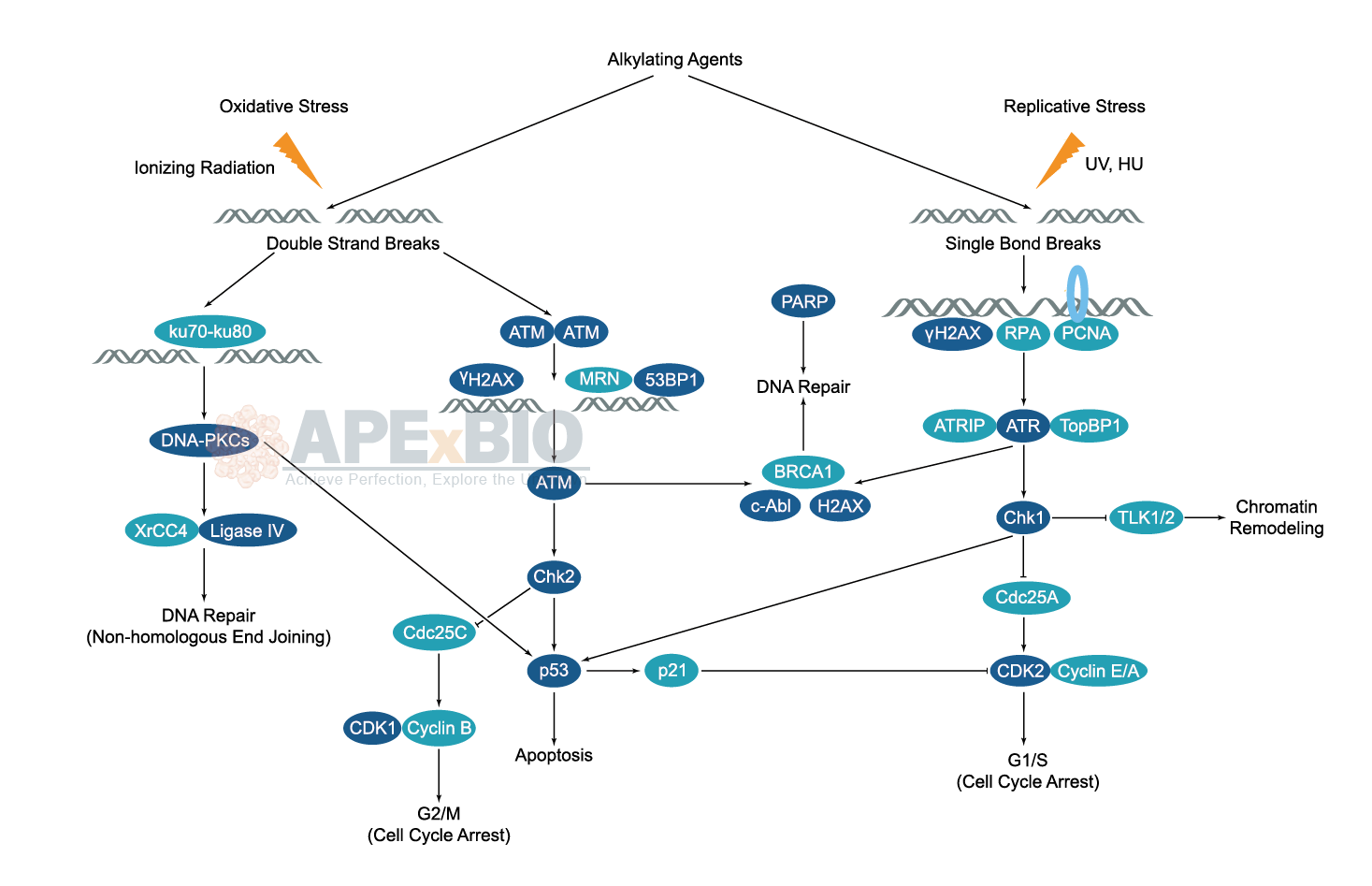DNA Damage/DNA Repair


The DNA in a human cell receives tens of thousands of damages per day due to both external (exogenous) and internal (endogenous) stress. The exogenous damages are caused by chemical contamination, UV light, ionizing radiation and alkylation/methylation etc, while the endogenous damages are coming from oxidation, alkylation and hydrolysis of bases etc. Since single strand and double strand breaks of DNA will occur after the damage, unrepaired DNA damage leads to cell senescent, apoptosis and malignancies etc. To overcome this threat, cell has developed DNA damage response, to detect DNA damage and mediate its repair.
DNA repair involves multiple mechanisms such as mismatch, base excision, and nucleotide excision repair etc. A group of proteins and pathways are participated in those processes. ATM/ATR kinases and DNA-PK are crucial for the detection of the DNA damage. Chromatin remodelers regulate chromatin accessibility for the DNA repair factors to function. RPA, Rad51 and the fanconi anemia proteins act directly on repairing the DNA damage. p53 network, the RAS GTPase superfamily, and the ubiquitin system also play important part in the DNA damage response. Aberrant DNA damage response is linked to aging, cancer and immune diseases.
-
 BA2325 PNU-159682Summary: PNU-159682, a metabolite of anthracycline neomycin, is a DNA topoisomerase II inhibitor with excellent cytotoxicity.
BA2325 PNU-159682Summary: PNU-159682, a metabolite of anthracycline neomycin, is a DNA topoisomerase II inhibitor with excellent cytotoxicity. -
 BA2327 Seco-DUBASummary: Seco-DUBA is a doxorubicin (DUBA) prodrug containing two hydroxyl groups, each of which can be coupled to an antibody via a linker.
BA2327 Seco-DUBASummary: Seco-DUBA is a doxorubicin (DUBA) prodrug containing two hydroxyl groups, each of which can be coupled to an antibody via a linker. -
 BA2328 SJG-136Summary: SJG-136 is an effective DNA cross-linking agent.
BA2328 SJG-136Summary: SJG-136 is an effective DNA cross-linking agent. -
 BA2332 SG2057Summary: SG2057 (DRG16) is a PBD dimer containing a glutaraldehyde bond that selectively binds sequences in the minor groove to form inter- and intra-strand cross-linked adducts of DNA.
BA2332 SG2057Summary: SG2057 (DRG16) is a PBD dimer containing a glutaraldehyde bond that selectively binds sequences in the minor groove to form inter- and intra-strand cross-linked adducts of DNA. -
 BA2344 DRF-1042Summary: DRF-1042 is an orally active camptothecin analog with inhibitory effects on DNA topoisomerase I.
BA2344 DRF-1042Summary: DRF-1042 is an orally active camptothecin analog with inhibitory effects on DNA topoisomerase I. -
 BA2349 Gly-7-MAD-MDCPTSummary: Gly-7-MAD-MDCPT is an anticancer agent.
BA2349 Gly-7-MAD-MDCPTSummary: Gly-7-MAD-MDCPT is an anticancer agent. -
 BA2351 TH1338Summary: TH1338, an orally active derivative of camptothecin, is a promising anticancer compound that exhibits excellent tumor cytotoxicity in vitro.
BA2351 TH1338Summary: TH1338, an orally active derivative of camptothecin, is a promising anticancer compound that exhibits excellent tumor cytotoxicity in vitro. -
 BA2352 Ac-ExatecanSummary: Ac-Exatecan is acetylated modified.
BA2352 Ac-ExatecanSummary: Ac-Exatecan is acetylated modified. -
 BA2353 Exatecan-amide-cyclopropanolSummary: Exatecan-amide-cyclopropanol is an anticancer agent.
BA2353 Exatecan-amide-cyclopropanolSummary: Exatecan-amide-cyclopropanol is an anticancer agent. -
 BA2357 Decyclohexanamine-ExatecanSummary: Derivatives of camptothecin.
BA2357 Decyclohexanamine-ExatecanSummary: Derivatives of camptothecin.


